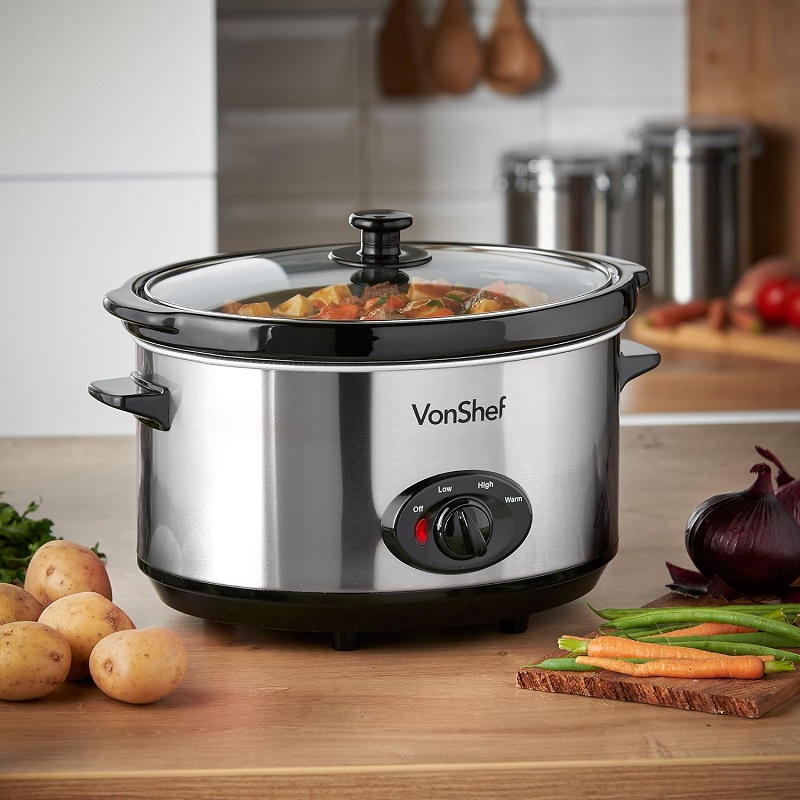We independently evaluate all of our recommendations. We may earn a small commission on some of the items you choose to buy.
Slow cookers are now a go-to appliance in many kitchens, providing an easy way to prepare meals while keeping energy costs low. With growing concerns over reducing carbon footprints and trimming utility bills, selecting an energy-efficient slow cooker has become increasingly vital.
Here are the best slow cookers that combine energy efficiency with excellent cooking performance, making them ideal choices for eco-conscious households.
Top Energy-Efficient Slow Cookers
Top Pick
1. Crockpot TimeSelect Digital Slow Cooker

Features
KEY ADVANTAGES
Performance
Summary
A versatile and efficient slow cooker with a large capacity and advanced programming options, perfect for family meals and stress-free cooking. Offers excellent ease of use and energy efficiency.
Best Value for money
2. Andrew James energy efficient slow cooker

Key Features
KEY ADVANTAGES
Performance
Summary
The Andrew James Slow Cooker is a versatile and user-friendly kitchen appliance, perfect for families looking to simplify meal preparation. Its generous capacity, coupled with energy efficiency and easy handling, makes it an excellent addition to any household.
Best Rated Slow Cooker
3. Morphy Richards energy efficient slow cooker

Key Features
KEY ADVANTAGES
Performance
Summary
The Morphy Richards 3.5L Easy Time Slow Cooker is ideal for small to medium-sized families, featuring a hob-proof pot for enhanced flavour and automatic heat adjustments. Its Keep Warm mode ensures your meals are ready when you are, making it a reliable choice for everyday cooking.
Best Budget
4. VonShef energy efficient slow cooker

Key Features
KEY ADVANTAGES
Performance
Summary
The VonShef 6.5L Slow Cooker is a reliable choice for large families, offering versatile cooking options and easy serving with its removable dish. Its modern design and efficient operation make it a valuable kitchen companion.
Are Slow Cookers Energy Efficient?
Yes, slow cookers are generally energy efficient. They operate at low temperatures and use minimal electricity over extended cooking times. Compared to conventional stovetops, which require higher energy input to maintain cooking temperatures, slow cookers consume significantly less energy.
This efficiency is particularly beneficial for slow-cooking dishes that require several hours of cooking time, making slow cookers a cost-effective and environmentally friendly option for meal preparation.
Features to Look for in an Energy Efficient Slow Cooker
When evaluating slow cookers, certain features can indicate better energy efficiency:
- Insulation: A well-insulated slow cooker retains heat more effectively, reducing the need for continuous energy input.
- Automatic Settings: Models with automatic shut-off or keep-warm functions can help conserve energy by preventing overcooking.
- Size: Choosing the right size for your needs ensures you’re not using more energy than necessary. Smaller slow cookers are often more efficient for single-person households or small families.
How to Maximise Energy Efficiency While Cooking
To get the most out of your energy-efficient slow cooker, consider these tips:
- Batch Cooking: Prepare multiple meals at once, which can be reheated later, reducing the need to use the cooker frequently.
- Lid Usage: Keep the lid on during cooking to maintain heat and avoid unnecessary energy loss.
- Use Low Settings: Whenever possible, cook on the lowest setting for the required amount of time. This is usually the most energy-efficient option.
Is a Slow Cooker More Energy Efficient Than an Oven?
In most cases, a slow cooker is more energy efficient than an oven. Ovens need to reach and maintain high temperatures, which requires substantial energy input. Slow cookers, on the other hand, use lower temperatures and draw much less power, even when operating for several hours.
For long-cooking dishes, a slow cooker can use up to 50-75% less energy than an oven, making it the more efficient choice for those looking to save on electricity bills and reduce their environmental impact.
